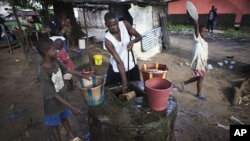American surgeons are using their expertise to teach Liberian doctors surgery skills and to give free surgery to children in Liberia, correcting facial deformities such as cleft palate, to the delight of thankful parents.
The medical team from the Minnesota-based non-governmental organization, Children’s Surgery International, arrived earlier this month and visited Monrovia for 10 days.
They performed 99 free surgeries on Liberian children suffering from cleft palates, urinary problems, hernias and other disorders.
The team of 25 doctors, surgeons, nurses and anesthesiologists brought all their own equipment and medicines from the United States.
They worked out of the Firestone Medical Center at Duside Hospital in Monrovia.
Serving children
The team also found the time to travel out to orphanages to present belated Christmas gifts to children.
“We do about three to four medical mission trips to serve children every year," said Lora Koppel, the chairman of the NGO. "One of our favorite places to come is here in Liberia because we have partnered with the people at Firestone as well as the staff at Duside hospital. The other thing that I’m very, very proud of is that all of us on the team, that makes up about 25 people from the States, are volunteering our time. None of us are paid to be here. We do it because we want to be here.”
Children’s Surgery International worked in partnership with the Firestone Rubber Company to organize the visit. Company president Dan Adomitis originally invited the team to Liberia in 2010 because he believes the U.S. surgeons can change lives.
“I am once again very excited about our mission here,"he said. "This is the third mission, and it’s helping so many children free of charge by some of the best surgeons in the world. They are doing miraculous surgeries that are changing lives. I know how hard it is for them to make the travel and to move equipment and medicines for this mission, but we are very happy to host them and to assist them, and we feel it is a service to Liberia that we wish to perform.”
Training locals
Adomitis says he feels that training local doctors is an essential service, to make sure expertise at the Liberian hospital improves.
“We feel it makes our Firestone Medical Center a better facility, that it gives additional training and experiences to our hospital staff that make them better healthcare professionals," he added. "So we think this is a situation where everybody wins. And, that’s a good thing.”
Success stories include a 23-year-old woman who had successful cleft surgery; a 13-year-old boy whose urinary problems, caused by falling from a tree, were cured and who can now return to school; and a seven-year-old patient who was discovered to have been assessed with the wrong sex at birth and had corrective surgery.
Team member Sally Lannin says it is of the utmost importance that the Liberian doctors learn the necessary skills to perform such surgery in the future.
“One of the things we are really trying to do is to take the opportunity to teach the doctors here, so that they are able to perform the surgery here on their own after we’re gone," said Lannin. "One of the things that we would do to make this mission a success would be, if after a number of years, we would never have to come back because the Liberian doctors would be able to do all the surgeries we know how to do. That would be our definition of success, if all the Liberian doctors here could know how to do cleft palates on their own, cleft lips on their own, fix hernias, that would be great. We, as an organization, are only interested in going to places in the world where the people there are interested in being taught how to do surgeries themselves, because it’s sort of like, you can catch a fish for a man and he can eat for a day, but if you teach him to fish he can eat for a lifetime. Well, you teach to be able to fix cleft palates and hernias and cleft lips, and you’ll be able to help children forever.”
Parents
Parents who brought their children to the hospital to be operated on sang Liberian cappellas - traditional hymns of praise and joy - and presented the team with a thank-you cake at the end of their visit.
Oretha, the mother of a child who was successfully operated on, says she is thankful for the team’s work.
“It’s fine, it’s alright," said Oretha. "Everything is okay. I thank you for the hard-working job you did on my son. God bless them, and God guard them.”
Duside Hospital Administrator Joy Philips says the mission was an outstanding success and that she hopes the team will be back next year.
“This process has really, really been a very good one," said Philips. "As you can see, mothers are going home today with children who came with all kinds of deformities in the last two, three days. We have actually had a few patients who have had such extensive surgery that they were required to remain longer than the two days that is usually required. I see three of them are actually going home this morning and that just tells you the level of efficiency and knowledge of the surgical procedures that the doctors here are performing on these patients."
Children’s Surgery International says it will return to Liberia next year.




